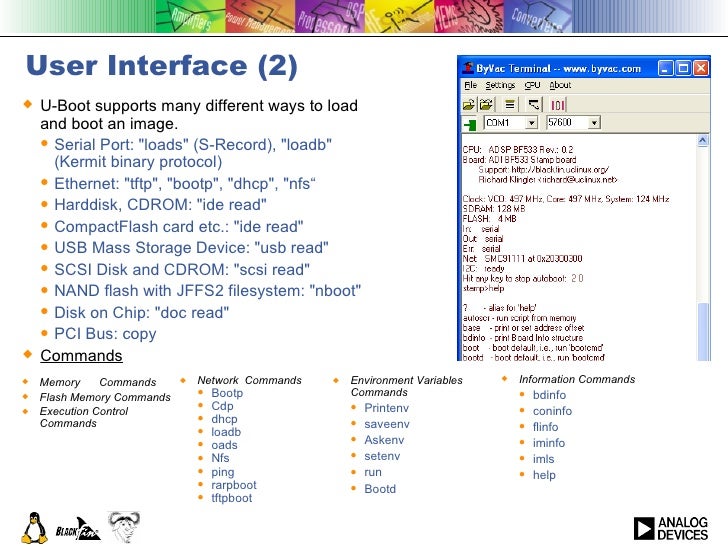
Ubuntu, CentOS, and openSUSE Desktops Focus on Three Major Linux Distribution Families Debian Family Systems (including Ubuntu and Linux Mint).SUSE Family Systems (including openSUSE).Red Hat Family Systems (including CentOS and Fedora).The families and representative distributions this course will focus on are: Instead, I will focus on the three major distribution families. Because there are literally hundreds of distributions, I'm not covering them all in this course. You are about to learn some more details about the many available Linux distributions. In order to fully benefit from this course, you will need to have at least one Linux distribution installed (if you are not already familiar with the term distribution, as it relates to Linux, you soon will be!). And describe the three major Linux distribution families.
U boot x86 software#
Describe the software environment required for this course.So if you want the text version of the course, read on! Chapter 1īy the end of this chapter, you should be able to: This tutorial falls under the Creative Commons BY 4.0 license. You can either read the text version of the course right here or you can watch the video version of the course on the YouTube channel (6-hour watch). I've taken their primarily text-based course and turned it into a video-based course. This content of this course was developed by the Linux Foundation (They call it LFS101x).
U boot x86 how to#
This course will teach you how to navigate Linux's Graphical User Interfaces and powerful command line tool ecosystem. In this comprehensive course, you'll learn many of the tools used every day by both Linux SysAdmins and the millions of people running Linux distributions like Ubuntu on their PCs. If you're new to Linux, this course is for you. > When I use 'bootm' to boot a uImage with uncompressed bzImage, I simply get: > => bootm 2000000 3000000 > # Booting kernel from Legacy Image at 02000000. > However I was unable to proceed some testing to verify this. > This function makes the assumption that the bootable binary is directly > the payload of the u-boot module, > ignoring the work done by "bootm_decomp_image" during the step before > and tries to boot directly in my case a gzip binary. > So the "do_bootm_linux" and finally "boot_prep_linux" from lib/x86, > since wer'e actually running on a x86 machine, is called. > bootm_os_load moves on and finds out that some compressed linux payload > shall be booted. > So, for doing this work, "bootm_decomp_image" is called, > this function uses the image-header for finding out the compression > method and does decompress the real payload to some location. > The task of this "do_bootm_states" is to find out what todo with the > provided image (u-boot module), > is it compressed or not, which kind of os should be booted. => bootm $ > this leads to call (coming through cmd/bootm.c) to "do_bootm_states". The boot of a u-boot module with bootm walks like this: > Signed-off-by: Hannes Schmelzer > - > arch/x86/lib/bootm.c | 4 ++- > 1 file changed, 2 insertions(+), 2 deletions(-) > Can you describe with what reproduce steps current codes are failing? thanks! > On Thu, at 1:45 PM Hannes Schmelzer > wrote: > If we're booting some u-boot module with compressed payload, we have to > use the pointer where the image really has been loaded (unzipped) to > instead the pointer to the payload of the u-boot module. Subject: x86/bootm: fix compressed image bootĬontent-Type: text/plain charset="utf-8" ToMXzr7fJix4XR5q0cvjmXRD8dRD94IpcVovYyZsUq7dIBkvfflfgxJ7+o3VFc8+ck1RYinO Y5ssOdHebRPLrrjlO6ro591irS19qPQhbIM08yXtUx4Ox9x//7KVYrVgl3liavFEu8r3TO0R OiZsZJnAyDcLyVGzkMxawMi0ilE8NzEzx0gvqUg3sbQkPzexJDM/Ty85P3cTIyQ0BXYw7n6jįYhRgINRiYd398l90UKsiWXFlbmHGCU4mJVEePVnAIV4UxIrq1KL8uOLSnNSiw8xSnOwKInzījTdEy0kkJ5YkpqdmlqQWgSTZeLglGpgjC/nvPj98cmMXTIMgn1OiQu/JewWmV/Fy+MYMc16 LVizaDUrxKAgiYd37oA1MwtoSyxb+JoZYrOcxM1zncwggyQEOpglTu1YAHWSkMTpxWehioQl LNSczLLUIn27BK6Maa2rGQu+slXcO76LqYHxFGsXIyeHhICJxMQ1Pxi7GLk4hAQ2M0ocXN/BĭpLgFRCUODnzCQuIzSZgLXHp+hFmEFtEQELiV/9VsAZmgWeMEm0zVoI1CAuYSnyfcALMZhFQ X-Brightmail-Tracker: H4sIAAAAAAAAA+NgFtrGLMWRmVeSWpSXmKPExsVyYAWjjW7O433RBgcvK1isv7uE0WLd19tMįlN74i2+bdnGaHF圓Qcmi7d7O9kd2DxmN1xk8Zg36wSLx85Zd9k9zt7ZweixZf9nxgDWKC6b Itemize by SMTP Server on BRSMTP01/Eggelsberg/AT/B&R(Release Serialize by Router on BRSMTPINTERN2/InternSMTP(Release X-MIMETrack: Itemize by SMTP Server on BRSMTPINTERN2/InternSMTP(Releaseĩ.0.1FP5|November 22, 2015) at 07:45:16, Received: from (Unknown_Domain )īy () with SMTP id B0.C8.04189.C63EEBB5

Received: from (īy (Postfix) with ESMTPS id DE162C21C2C Received: from (localhost )īy (Postfix) with ESMTP id C9F18C21C93 X-Spam-Status: No, score=-0.0 required=5.0 tests=SPF_HELO_PASSĪutolearn=unavailable autolearn_force=no version=3.4.0 X-Spam-Checker-Version: SpamAssassin 3.4.0 () on Received: from ( )īy (Postfix) with ESMTP id 42W0LG3ZjQz9s9h


 0 kommentar(er)
0 kommentar(er)
